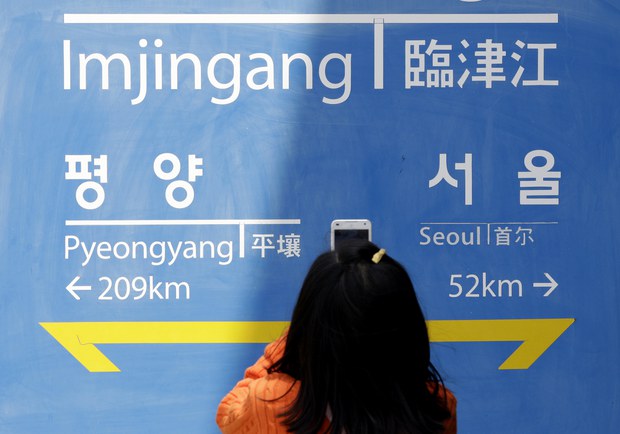South Korea names former North Korean diplomat as aide to unification minister
Share

A South Korean girl takes picture of a sign showing the distance to North Korea’s capital Pyongyang and South Korea’s Seoul near the border village of Panmunjom, on the demilitarized zone (DMZ) that separates the two Koreas since the Korean War, April 14, 2012.
Seoul has appointed a North Korean defector as its top policy aide on Wednesday, underscoring the Yoon Suk Yeol administration’s renewed stance towards a more hardline policy on Pyongyang.
South Korea’s Unification Ministry appointed Ko Young-hwan, who had worked as a North Korean diplomat before defecting to South Korea in 1991, as minister Kim Young-ho’s Special Assistant Aide.
Ko is expected to advise the unification minister on issues concerning “international cooperation [on North Korea] and North Korean defectors”, and to expose “the reality of North Korea,” the unification ministry said in a statement.
The appointment of Ko is likely to incite fury from Pyongyang. North Korea has usually expressed its strong opposition when defectors take significant governmental roles in the South.
Before North Korean defector-turned-South Korean lawmaker Thae Yong-ho ran for election in 2020, North Korea called him “human scum” via its state media, condemning his potential rise to prominence in the South.
What appears to be emotionally-charged responses reflect both the Kim Jong Un administration’s sense of betrayal, as well as its need to publicly denounce these individuals to maintain the regime’s internal grip on power and propaganda.
North Korea, which relies on tightly controlled propaganda, perceives its defectors as threats to its regime, as they may counteract the state narrative with their firsthand accounts. High-profile defectors are particularly sensitive to the regime, as they directly challenge its legitimacy, inspiring internal dissent and jeopardizing the state’s solidarity.
“The Kim regime perceives the success of defectors in the South as a direct threat against itself,” said Ji Seong-ho, who defected from North Korea to South Korea, where he’s now a member of the national assembly. “The North Korean people have long been propagated with this belief that survival outside the North is impossible. Defectors’ success therefore undermines the regime’s narrative.
“Given Ko’s expertise on North Korea, he is most likely to pinpoint North Korea’s human rights violations. I hope that he highlights these important issues, particularly on the issues of forced returns of defectors to the North.”
Hardline policy on North Korea.
Ko’s appointment aligns with the Yoon administration’s renewed stance in pursuit of a hardline policy on Pyongyang, amid its nuclear provocations.
“Until now, the unification ministry has functioned more like a ‘North Korea-aid-organization’, and this needs to change,” Yoon said in July. Historically, the ministry has primarily focused on bolstering inter-Korean cooperation through humanitarian aid.
During past administrations, Seoul consistently sought ways to provide humanitarian assistance to North Korea, both directly, and indirectly through China, even throughout the most strained periods of inter-Korean relations, a former unification ministry official told Radio Free Asia.
Yoon’s policy is largely embraced by South Korea’s conservatives as it closely aligns with the U.S. stance on North Korea’s denuclearization. However, it faces substantial criticism from progressives who believe it escalates tensions with Pyongyang and ultimately undermines engagement efforts that could bring a permanent peace on the peninsula.
Ko, born in 1953 and a graduate of the prestigious Pyongyang University of Foreign Studies,started his diplomatic career in 1979. He also worked as a translator for the late North Korean leaders, Kim Il-sung and Kim Jong-il.
Edited by Elaine Chan and Mike Firn.







